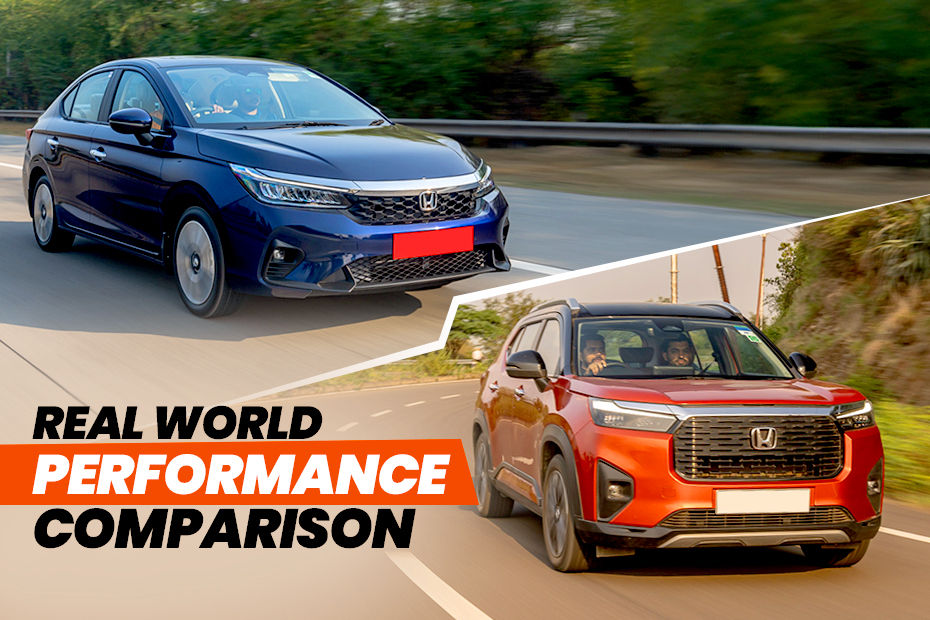Honda Elevate CVT vs Honda City CVT: Real-world Performance Comparison
Modified On Mar 18, 2024 12:16 PM By Shreyash
- Write a comment
Both Honda Elevate and Honda City use the same 1.5-litre naturally aspirated petrol engine

The Honda Elevate arrived in 2023 as Honda’s long-awaited compact SUV into India. It shares many of its mechanical aspects with the Honda City, utilising the same platform and powertrain. Recently, we had the automatic CVT variants of both these cars with us, and we tested the real-world performance of these Honda siblings. Let’s see which one is quicker.
Before we head on to performance results, let’s have a look at their engine specifications:
Powertrain Details
| Specifications |
Honda Elevate |
Honda City |
| Engine |
1.5 litre naturally aspirated (NA) Petrol |
|
| Power |
121 PS |
|
| Torque |
145 Nm |
|
| Transmission |
CVT |
|

While both of these cars are available with the option of a manual transmission as well, we will only discuss the performance of the CVT versions that we tested.
Also Check Out: Honda Elevate CVT Automatic Fuel Efficiency: Claimed vs Real
Acceleration Test
| Tests |
Honda Elevate CVT |
Honda City CVT |
| 0-100 kmph |
12.35 seconds |
10.94 seconds |
| Quarter Mile |
18.64 seconds at 125.11 kmph |
17.87 seconds at 130.39 kmph |
| Kickdown (20-80kmph) |
7.2 seconds |
6.36 seconds |

In the 0-100 kmph sprint, the Honda City was quicker by 1.4 seconds than the Honda Elevate, however the difference came down below 1 second for completing a quarter mile.
In the kickdown from 20 to 80 kmph, the difference between their timings was again less than 1 second. According to the kerb weight data available, the Honda Elevate is heavier than the City by over 100 kg, which likely explains why the City was quicker. The comparatively more aerodynamic shape of the sedan is likely another factor in its quicker performance over the SUV.
Braking Test
| Tests |
Honda Elevate CVT |
Honda City CVT |
| 100-0 kmph |
37.98 metres |
41.88 metres |
| 80-0 kmph |
23.90 metres |
26.50 metres |
When braking from 100 kmph to a complete stop, the Elevate travels almost 4 metres less than the Honda City. Even when braking from 80 kmph, Honda’s SUV beats the City by a margin of 2.6 metres. Both the Elevate and the City come with front disc brakes only.
The Honda Elevate uses wider 215-section tyres on 17-inch alloy wheels whereas the Honda City is equipped with relatively narrower 185-section tyres on 16-inch alloy wheels.
Takeaways
So, the Honda City offers quicker acceleration than the Honda Elevate, but the Elevate has better braking performance than the City. Although they use the same engine and transmission, the difference in their performance may be due to the variation in their weights and wheel sizes.
Disclaimer: Please note that the performance figures may vary depending on the driver, driving conditions, and climate.
Price
| Honda Elevate |
Honda City |
| Rs 11.58 lakh to Rs 16.20 lakh |
Rs 11.71 lakh to Rs 16.19 lakh |
All prices are ex-showroom
Read More on : Honda Elevate on road price
4 out of 4 found this helpful















